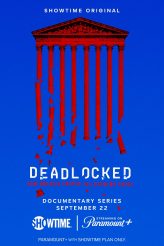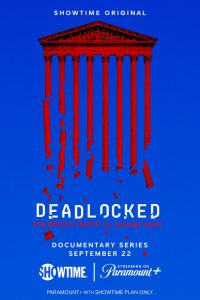DEADLOCKED: HOW AMERICA SHAPED THE SUPREME COURT is a new four-part documentary series about the history of our highest court. It premieres on Showtime and Paramount+ on Friday, September 22, with new episodes available on subsequent Fridays.
DEADLOCKED filmmaker Dawn Porter has won multiple awards and nominations for her previous documentaries, which include JOHN LEWIS: GOOD TROUBLE, GIDEON’S ARMY, the miniseries BOBBY KENNEDY FOR PRESIDENT, the docuseries PHILLY D.A., and several episodes of PBS’s INDEPENDENT LENS.
In a Zoom call with Assignment X, Porter talks about what DEADLOCKED shows us about the U.S. Supreme Court.
ASSIGNMENT X: What made you decide that you wanted to do a documentary series about the Supreme Court?
DAWN PORTER: Well, I’m a lawyer, and I practiced for seven years before turning to film and becoming a filmmaker. Most of my films have some kind of relationship to law, or legal issues, or social change through that mechanism. But really, I was watching the direction of the Court with increasing concern. I felt like most people really aren’t necessarily Court watchers, and I wanted to back up [historically] and give some context to what we’re seeing now. So, it was really this desire to help explain how we got to where we are.
AX: When did you actively start working on DEADLOCKED?
PORTER: We started almost three years ago. When it first started, Vinnie Malhotra called me up. He now runs the Obamas’ production company, but at the time, he was the senior executive at Showtime Documentary Films. We used to work together at ABC News, where I worked for about seven years. He knew I was a lawyer, and he said, “Do you want to do something about the Supreme Court?” And I said, “Yes, I do” [laughs].
But we didn’t have an idea of exactly what it would be, and so it took a little time to figure out, “You know what? We need to march people through something they’re familiar with – the Warren Court, the very liberal Court that gave us all these important decisions, Brown v. Board [of Education], and the Miranda Rule, all these important decisions – and then, what happened? What happened over time to get to where we are now, where we’ve overturned Roe v. Wade, where the justices are stepping away from giving agencies the power to regulate health and the environment? How did we get here?” And so, I wanted to help people understand how we got here.
AX: Who was President at the time you started?
PORTER: I think Trump was still President when we started. So, it was before the 2020 election.
AX: Would you still have made the same film if you’d started after you knew he wouldn’t be President now?
PORTER: Yeah, because we’re stuck with this Court [one-third of which were appointed by Trump]. That’s one of the reasons why the Court is so important, is because these are lifetime appointments. When the composition of the Court does not change very often, and when you have these Presidents that have an outsize influence on the Court, people need to understand that’s how we got the Court that we have today. Donald Trump, having three appointments, has probably sealed the composition of the Court for the next three decades. So, we have to understand what that means.
AX: Why is the documentary titled DEADLOCKED? Because unless the size of the Court changes, it cannot be deadlocked – there are nine Justices, so the decisions can never be an even number for and against.
PORTER: Well, there’s no “nine” in the Constitution. Sometimes we’ve had eight [Supreme Court Justices], and then you could have four and four. But Showtime chose the title [laughs]. But I think what it refers to is this feeling that we’re stuck, this feeling that the Court and the Congress and the Executive [branches] are in this position these days where they’re not quite functioning the way that we would hope. The Congress is not, for example, implementing ethical rules for the Court. The Executive – there’s a lot of pressure on Biden right now to either impose some ethics rules, or even consider increasing the size of the Court. There are some things that people have suggested. But it feels like we’re in this stalemate right now, that we’re not getting a lot of movement. And so, we are stuck with a Court that is not obeying precedent, that is rewriting the rules of Supreme Court jurisprudence.
AX: At the outset, were you told, “Make DEADLOCKED as four one-hour blocks,” or did you start editing and then decide on the length of it once you were doing it?
PORTER: Yeah, definitely not told [laughs]. I knew it wasn’t a feature, that it would be this limited series. We settled on four episodes. We easily could have done six; there was so much to cover.
One of the things I really appreciated is, Showtime Documentaries is very filmmaker-friendly. We really kind of together said, “What can we do with the budget that we have that’s going to make the most impact?” There’s a lot more I wish we could have covered, but I’m grateful for the real estate we have to cover the topics that we were able to address.
AX: What would you say are the major topics or themes of DEADLOCKED?
PORTER: There are substantive topics, like race, LGBTQ, women’s rights, gun legislation, gun rights, religious influence on the Court, and also, of course, the conservative Federalist Society, and their outsize impact on helping to appoint, and get confirmed, this conservative bloc that we have today.
So, those are some substantive issue areas, but there’s also a discussion about process, and about how the Court is making its decisions these days. There’s a lot of discussion about the shadow docket, and also about the expedited way that some cases are making their way to the Court, but also about the lack of respect for precedent. Overturning Roe v. Wade is one that we’re all familiar with, but we’ve also seen this Court overturn I think almost a hundred years of jurisprudence on gun regulation. Gun regulation was very well-settled, until this Court decided in favor of gun manufacturers. So, there’s also stepping away from allowing the Executive branch to allow agencies to issue rules about health and safety.
There’s a very, very significant line of cases. This Court has said that the EPA does not have the jurisdiction to implement rules that the EPA has tried to implement. So, there’s a lot of process that is being changed before our eyes that’s incredibly significant to people, and it will be felt for many, many years to come.
AX: There is a lot in the news these days about ethics issues surrounding what some Supreme Court members may have received as gifts, and whether those gifts possibly influenced their rulings. Do you get into that at all, or did that come out in the news after you finished editing?
PORTER: We were almost finished. What we do get into is the leak [about the Dobbs decision prior to it being announced from the bench], and the idea that there are conservative forces that were privy, possibly, to decisions before they came out. We didn’t have time to get into the myriad ethical issues that have emerged in the last couple of months, because we were done. And obviously. I was sad about that, because it felt like every single time we tried to stop that something new that was significant would happen [laughs].
But what I’ve been thinking about in recent weeks is, part of what a long-form documentary series can do is a deeper dive into history, and contextualize what we’re seeing. And I’m very happy to join with the breaking news, present-day coverage of the things that are continuing to be revealed to us.
Long-form documentary doesn’t follow breaking news very well. Our schedules are locked in for months, and we have a whole long process we have to follow in order to get a film out. So, we leave the breaking news to the people who cover breaking news, usually, in print or in daily news shows. What we do in the series, I think, is try to provide the context, so you understand how we got to this place.
AX: What is your balance between new material that you shot for the documentary and archival material?
PORTER: In this series, which is four hours, two hundred minutes of it is archive. We looked through, I think it was, more than seven thousand individual pieces of archive in order to construct the series. When you’re looking into how [to put topics in] context, it’s a marriage of both elements.
What was really important to me was finding the archive that would allow viewers to judge for themselves. We’re living in a time when people are very mistrustful of the sources of information, so we tried hard not to just have a parade of talking heads, but to have the experts that we tapped be able to contextualize and explain what we were seeing.
But I wanted as much as possible for people to be able to see it for themselves. So, you hear Justice Warren say, “I didn’t have a confirmation hearing” [laughs]. You see Jerry Falwell literally take the evangelicals in a direction to influence the Court. You see Brett Kavanaugh there, in Bush v. Gore, talking about how he’s trying to get President Bush elected. So, as much as possible, we tried to let that archival [material] speak for itself, but then we had some of the best experts in the country contextualizing and giving their information. Also, I tried really hard to have good political representation across the spectrum. So, we have a number of people who would self-identify as conservative who appear very prominently in the series.
AX: Is there any footage that you came across that changed how you thought about anything?
PORTER: I would say the first thing that comes to mind is the clip of Mitch McConnell, in response to [then-President Ronald Reagan’s nominee] Judge Bork not being confirmed, and Mitch McConnell saying explicitly that he will work to shoot down nominees from the other party. And he sure has done that. So, that clip is from, what, almost years ago, and he’s still making good on that promise. Don’t make Mitch McConnell mad, I guess, is the lesson.
AX: Do you think you might make a sequel to DEADLOCKED?
PORTER: I would love to, but no one’s asked yet. We’ll see.
AX: What are you working on now?
PORTER: I just finished a project for Amazon called THE POWER OF THE DREAM, about how the WNBA players helped elect Raphael Warnock. And I also just finished executive-producing six hours for HBO the next installment of the civil rights series EYES ON THE PRIZE. So, we have the next installment of EYES ON THE PRIZE coming to HBO.
AX: And what do you most hope people will get out of DEADLOCKED?
PORTER: I hope that people will remember that the Court derives its authority from the public’s trust and perception, and that the Court can earn our respect and ability to obey, or they can lose our respect, and that what separates the democracy from more authoritarian nations is that we have a judicial process that is fair, that is truthful, and that obeys certain ethical rules. And if we lose that, we really fundamentally harm our democracy.
Follow us on Twitter at ASSIGNMENT X
Like us on Facebook at ASSIGNMENT X
Article Source: Assignment X
Article: Exclusive Interview: Filmmaker Dawn Poreter talks about her new four-part Showtime docu-series DEADLOCKED: HOW AMERICA SHAPED THE SUPREME COURT
Related Posts:












